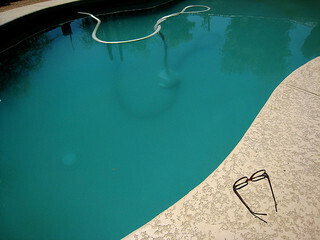Short answer: yes, you should be worried about algae in your pool! Fortunately, even if you’ve been too busy with sports practices, family vacations, and weekend road trips to prevent algae growth–we’ll also explain how to quickly treat and prevent conditions can promote algae growth.
What Is Algae?
Algae, single-celled plants, were some of the first life forms on the planet. There are thousands of types of algae, though the most common algae we’re familiar with are of the pool and green variety. There are also pink, yellow and even “black” pool algae.
While black pool algae is more of a green-blue color, it often clings to the pool’s surfaces and can develop many layers, making it pretty tolerant of chlorine. Black pool algae forms from green algae that has died, crystalized and tried to grow again. Yellow, or “mustard,” algae look like yellow powder, and usually develop in shady areas of a swimming pool.
What Pool Conditions Promote Algae?
Algae develop from spores (seeds, essentially), which can enter your pool by rain, wind or other contaminated items. Since algae are plants and contain chlorophyll, they grow by photosynthesis – meaning they love the sun. Add to this unbalanced chemicals (low chlorine level), warm temperatures, stagnant water or clogged filters, and you could have an algae bloom overnight, hindering everyone’s summer swimming fun.
Is Algae Harmful?
Considering how common green pool algae are, we’re lucky that they are not directly dangerous. However, if you’ve been in a pool with even minor traces of algae, you are familiar with the sliminess that it leaves behind on your skin. Imagine that same coating on pool floors or creeping onto pool ladders, rails, decks and other surfaces – not safe! Algae can also develop into bacteria, like e-coli. These bacteria and germs that can feed on and develop from algae can be dangerous if one were to come into contact. Not to mention, swimming in off-colored water is simply not appealing.
In regards to your pool, algae buildup can cause filters and skimmers to get backed up, preventing water from circulating, and therefore contributing to more algae growth. Excessive algae will obviously discolor your water, and if bad enough, prevent you from being able to see what or who is below! So, is a trace of pool algae going to ruin your whole summer or swim season? Probably not. Can pool algae worsen and cause major problems if left untreated? Yes, and very quickly.
Now that you’re informed about algae, what do you do to get rid of it? Check back for our upcoming post that will give you five ways to keep your pool algae free!

